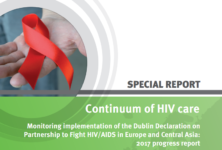The worldwide burden of hepatitis C virus (HCV) infection is a major public health concern. New direct antiviral agents (DAAs) have revolutionised the management of HCV infection, with eradication rates higher than 90%. However, their high cost has precluded their widespread use, leading to restrictive conditions of prescription in many countries. DAAs have been available to all people living in France who are infected with HIV for 2 years (first via temporary authorisation and then via marketing authorisations) regardless of their liver fibrosis stage. The cost of this treatment is supported by the French Social Security. Knowledge of whether and why some patients did not benefit from this universal access could help achieve the new French goal of universal treatment for all (regardless of HIV status) that was set in May, 2016, and in adjustment of public health policies.
A survey was done in June, 2016, in north-eastern France on a cohort of 10 087 patients infected with HIV, who were all screened for HCV. 1041 (10·3%) of these patients were HCV seropositive, and of the 742 who did not clear HCV spontaneously, 308 (41·5%) were successfully treated with previous standard bitherapy (pegylated interferon and ribavirin). Of the 434 patients who should have received new DAAs, 235 (54·1%) had been given or were on DAAs at the time, whereas 199 (45·9%) were not. The reasons why patients did not have treatment, assessed via a standardised questionnaire in 183 patients, are reported in the figure.
2 years after the possibility of treatment for all in HIV-infected patients, nearly half of patients had been effectively treated with DAAs. One-quarter of the patients who were not lost to follow-up and who should have been offered DAAs are still not planned to receive them. Physicians felt that DAA therapy was not urgently needed for 41% of patients. Addictions are still barriers to treatment, and the fact that 11% of patients were unwilling to be treated might reflect a scarcity of information or a fear of losing welfare allowances associated with chronic HCV disease, thus adding to social difficulties, which are a main barrier to treatment.
Although HCV screening is not a concern in people living with HIV, a gap between universal access and universal effective treatment remains, partly caused by the difference between the need to treat and the urgency or the possibility of doing so, and underlying economic considerations. Reducing the cost of DAAs, therapeutic education, social support, a different attitude to addictions, and coherent health policies towards migrants should increase the rate of treatment, reduce the viral burden, and contribute to the eradication of epidemics.
By Lionel Piroth, Christian Rabaud, David Rey, Jean-Luc Schmit, Catherine Chirouze, Geneviève Beck-Wirth, Olivier Robineau, Firouze Bani-Sadr for the ICONE Study Group
LP reports personal fees and non-financial support from Bristol-Myers Squibb; personal fees from Gilead and Pfizer; and non-financial support from Viiv Healthcare, MSD, and Janssen Cilag, outside the submitted work. CR is a member of the board for Gilead and MSD. DR reports personal fees from Gilead, MSD, Bristol-Myers Squibb, and ViiV, outside the submitted work. J-LR, CC, GB-W, OR, and FB-S declare no competing interests.


 ПОИСК ПО САЙТУ
ПОИСК ПО САЙТУ  поиск по ресурсному центру
поиск по ресурсному центру 


